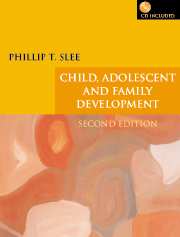Book contents
- Frontmatter
- Contents
- List of Trends and issues
- List of Family life-cycles
- List of Figures and Tables
- Note to the Student
- Note to the Instructor
- How to use the CD-ROM
- Acknowledgements
- Introduction
- Part 1 The Study of Human Development
- Part 2 Conception and Birth
- Part 3 Infancy
- Part 4 Toddlerhood
- Part 5 The Pre-school Years
- 12 Physical Development of Pre-schoolers
- 13 Cognitive Development of Pre-schoolers
- 14 Social and Emotional Development of Pre-schoolers
- Part 6 Middle Childhood
- Part 7 Adolescence
- Part 8 Studying Human Development
- Glossary
- References
- Index
- STUDENT FEEDBACK FORM
13 - Cognitive Development of Pre-schoolers
from Part 5 - The Pre-school Years
- Frontmatter
- Contents
- List of Trends and issues
- List of Family life-cycles
- List of Figures and Tables
- Note to the Student
- Note to the Instructor
- How to use the CD-ROM
- Acknowledgements
- Introduction
- Part 1 The Study of Human Development
- Part 2 Conception and Birth
- Part 3 Infancy
- Part 4 Toddlerhood
- Part 5 The Pre-school Years
- 12 Physical Development of Pre-schoolers
- 13 Cognitive Development of Pre-schoolers
- 14 Social and Emotional Development of Pre-schoolers
- Part 6 Middle Childhood
- Part 7 Adolescence
- Part 8 Studying Human Development
- Glossary
- References
- Index
- STUDENT FEEDBACK FORM
Summary
‘I Wonder if I was Changed in the Night?’
‘Dear, dear! How queer everything is today! And yesterday everything happened just as usual: I wonder if I was changed in the night? Let me think: was I the same when I got up this morning? I think I remember feeling rather different. But if I'm not the same, who in the world am I? Ah, that's the great puzzle!’
Lewis Carroll, Alice's Adventure in WonderlandKEY TERMS AND CONCEPTS
Egocentrism
Conservation
Animism, artificialism and realism
Imaginary companion
Telegraphic speech
Stimulus–response theory
Social learning theory
Introduction
Children's understanding of the world and their place in it undergoes rapid development during the pre-school years. This understanding is accompanied by significant changes in their use of language. The pre-schooler's behaviour is dramatically different from that of a child during the ‘terrible twos’ (just ask any parent!). The temper tantrums, refusals to comply and use of the word ‘No!’, so characteristic of the 2-year-old, contrast sharply with the 4- to 5-yearold's ability to comprehend instructions, comply with requests and generally reason about the world.
This chapter focuses on the nature of children's cognitive development in the pre-school period. More particularly, consideration is given to a number of theorists, namely Piaget, Bruner and Vygotsky, and their views of the way children's thinking develops during this period. An examination is also made of children's language development in the pre-school years.
Various topics related to pre-schoolers' cognitive development are discussed, namely: the intriguing nature of pre-schoolers' ‘magical’ ways of thinking; the importance of fairytales; the role of computers; and preparing for school.
- Type
- Chapter
- Information
- Child, Adolescent and Family Development , pp. 264 - 287Publisher: Cambridge University PressPrint publication year: 2002



